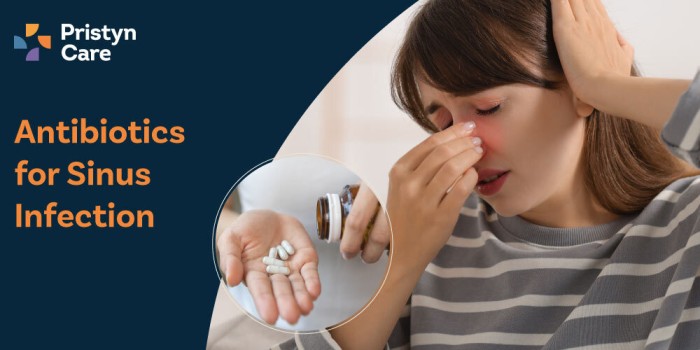
Antibiotics should be taken when a person is suffering from acute sinusitis that lasts more than 10 days and gets worse every week. Some of the common symptoms are facial pain or pressure, stuffy nose, thick nasal mucus.
Although 60% of acute sinusitis episodes will resolve with home remedies, taking antibiotics can shorten the duration of illness and reduce the risk of complications.
Table of Contents
What are the antibiotics for treating sinus infection?
Augmentin
This is a prescribed antibiotic that belongs to the penicillin class of antibiotics. This antibiotic is made up of two drugs- amoxicillin and clavulanic acid. It is available in three forms- tablets, pills and liquid suspension. Some of the side effects of taking augmentin are- diarrhea, nausea, vomiting, etc. For sinusitis, Augmentin is the first-choice for doctors.
Zithromax
Commonly referred to as azithromycin, it is an antibiotic that fights bacteria. Not only sinus infection, but this antibiotic can also cure bacterial infections in skin, ear and sexually transmitted diseases. Some of the side effects that can occur after taking medicine are- diarrhea, nausea, stomach pain or headache. People suffering from liver, kidney problems should consult with the doctor before taking this medicine.
Levaquin
This is a type of fluoroquinolone that can cause serious side effects. Remember that this medicine should not be used unless these cannot be treated with other antibiotics. People with blood circulation issues, heart problems, kidney issues or diabetes should be cautious before taking this antibiotic. Some of the side effects reported are- sore throat, burning in the eyes, redness, fever, etc.
Bactrim
This antibiotic is made up of two types of drugs- sulfamethoxazole and trimethoprim. Doctors prescribe Bactrim to cure- ear infections, urinary tract infections, bronchitis, diarrhea, pneumonia, as well as sinusitis. Sinusitis patients who are already suffering from liver ailments or anemia should beware of the severe side effects that can follow.
Amoxicillin
When sinuses don’t drain the mucus properly, there is a build-up that can get infected. In such cases, amoxicillin can help. It also treats stomach ulcers, tonsillitis, bronchitis, pneumonia, chlamydia, urinary tract infection, etc.
Septra
The main benefit of taking Septra is that it prevents the bacteria from becoming drug-resistant. Some of the severe side effects that can occur after taking Septra include severe stomach pain, skin rash, yellowing of the skin, joint pain, swelling, bruising, increased thirst, electrolyte imbalance, low blood cell counts. Pregnant or lactating women should not take this medicine.
What are some common side effects of taking antibiotics for sinusitis?
Some of the side effects people are likely to experience after taking antibiotics for sinusitis are-
- Nausea
- Vomiting
- Diarrhea
- Rash
- Hives
- Lightheadedness
Are antibiotics effective in curing sinusitis?
According to a clinical review published in the New England Journal of Medicine, patients suffering from acute sinusitis were reviewed for four weeks. The discerning fact that emerged was most sinus infections will improve or clears on their own with antibiotics.
However, antibiotic resistance is a significant issue who regularly consumes antibiotics. Several bacteria carry a gene for antibiotic resistance that turns on when it comes in contact with an antibiotic. After a course of 4-7 days of antibiotics, the person may stop responding to the antibiotics. In such cases, it is imperative to meet an ENT specialist.
How to treat sinus infections at home?
In addition to taking antibiotics, here are some home remedies that can alleviate sinus pressure are-
- Drink lots of fluids
- Eat immunity-boosting foods
- Breathe in moist air
- Wash the sinuses with oils
- Use a neti pot
- Apply some warm compresses
- Eat spicy foods
- Inhale steam
Read More: How to cure sinus headache?
How to prevent sinus infections?
Here are the top 10 tips that can help in prevention sinusitis in the future-
- Wash hands regularly to prevent frequently-touched objects such as doorknobs, switches, etc, from getting contaminated.
- Avoid coughing in the open air or into your hands.
- Stay indoors till the symptoms don’t go away.
- Keep the infected person’s drinking glasses, utensils, water bottles, or food separate.
- Using a new toothbrush after the tonsillitis patient has recovered.
- Keep the shared living spaces clean and disinfected regularly.
If you are suffering from sinusitis for very long and not responded to the antibiotics, get in touch with a Pristyn Care ENT doctor who can prescribe other treatment options including surgery.
Read More:







